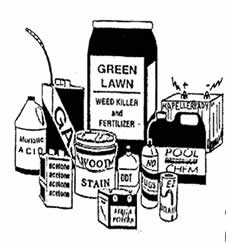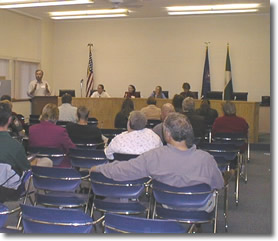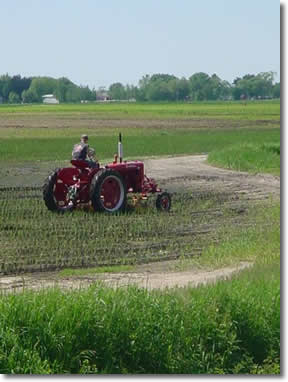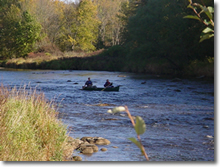How You Can Help




General Watershed Information | Watershed Threats | How You Can Help | Watershed Resources
Homeowners
Local Decision-Makers
Agricultural Producers
Recreational Users
The well-known stories about environmental problems tend to focus on big, recognizable targets such as smoking industrial facilities, leaking toxic waste dumps, and messy oil spills. As a result, people often forget about water pollution caused by smaller nonpoint sources--especially pollution at the household level. Below are some recommendations to protect water quality in your community.
- Limit the amount of impenetrable surfaces in your landscape. Use permeable paving surfaces such as wood decks, bricks, and concrete lattice to let water soak into the ground.
- Allow thick vegetation or buffer strips to grow along waterways to slow runoff and soak up pollutants. Plant trees, shrubs, and ground cover. They will absorb up to 14 times more rainwater than a grass lawn and don't require fertilizer.
- Use natural alternatives to chemical fertilizers and pesticides. If you must use chemicals, test your soil to determine the right amount. See also Citizen's Guide to Pest Control and Pesticide Safety. (PDF format)
- Don't hose down driveways or sidewalks. Dry sweeping paved areas, along with careful trash disposal, are simple, effective pollution reducers.
- Gutters and down spouts should drain onto vegetated or gravel- filled seepage areas - not directly onto paved surfaces. Splash blocks also help reduce erosion.
- Divert runoff from pavement to grassy, planted or wooded areas of your property, so stormwater can seep slowly into the ground.
- Compost grass clippings and leaves. Never allow them to wash into roadways where they will reach storm drains.
- Get involved in the planning and zoning process in your community. That's where the decisions are made that shape the course of development and the future quality of our environment.
- Place litter, including cigarette butts, in trash receptacles. Never throw litter in streets or down storm drains.
- Properly dispose of household hazardous wastes. Many common household products, (paint thinners, moth balls, drain and oven cleaners, etc.) contain toxic ingredients. When improperly used or discarded, these products are a threat to public health and the environment. Do not pour hazardous products down any drain or toilet. Do not discard with regular household trash. Learn about natural and less toxic alternatives and use them whenever possible. Contact your County Solid Waste Management Office for information regarding hazardous waste collection in your area.
- Recycle all used motor oil by taking it to a service station or local recycling center. Motor oil contains toxic chemicals that are harmful to humans and animals. Do not dump used motor oil down storm drains or on the ground.
- Animal wastes contain bacteria and viruses that contaminate shellfish and cause the closing of bathing areas. Pet owners should pick up after their pets and dispose of the wastes in the garbage or toilet.
- Wash your car on the grass so soapy water soaks into the ground. Use a hose nozzle to prevent water from running when not in use.
Dispose of used oil, antifreeze, paints, and other household chemicals properly
Local government is the first line of defense for our environment. By working cooperatively with state and federal environmental protection officials and local watershed / conservation entities, local officials can ensure that the right plans, regulations, and effective coordination mechanisms are in place to protect our environment. Below are some important points and environmental protection options relative to wetlands, soil erosion / sedimentation control, and floodplains, which local governments can use when making land use decisions.
WETLANDS
- Wetlands essentially function like natural sponges, storing water, filtering it, and then slowly releasing it.
- Although artificially constructed wetlands can provide aesthetic services of a naturally occurring wetland, they take many years to establish and rarely provide the same groundwater recharge functions or plant and animal habitat as naturally occurring wetlands.
- It is better economically and environmentally to protect existing wetlands, or focus efforts into wetland restoration, rather than try to build costly and less effective artificial wetlands.
- A local unit of government has the authority to create wetland regulations that address wetlands not protected by the state. Local units of government can adopt and administer their own wetland regulations, provided they are at least as restrictive as state regulations.
- Ultimately, local control of wetlands can lead to better protection of the resource because it serves as an added layer of regulatory protection.
SOIL EROSION & SEDIMENTATION CONTROL
- Sedimentation decreases water clarity, degrades fish and wildlife habitat, and adversely impacts water quality. Particularly damaging to water resources are the excess nutrients and contaminants attached to eroded soil.
- Part 91, Soil Erosion and Sedimentation Control of Natural Resources and Environmental Protection Act (NREPA) is a State Act which regulates only earth change activities. It does not regulate all activities that local governments may want to address in order to protect aquatic resources.
- Counties and municipalities can adopt soil erosion and sedimentation control ordinances that require permits for earth change activities not regulated under Part 91 such as wetlands, storm drains, or earth change on less than one acre.
FLOODPLAINS
- The term floodplain has come to mean the land area that will be inundated by the overflow of water resulting from a 100-year flood (a flood which has a 1% chance of occurring in any given year).
- Floodplain guidance comes from both the state and federal governments and focuses on protecting people and property rather than natural resources.
- Impervious surfaces, such as pavement or compacted soils, are not regulated - yet they may affect the severity of flood impacts. Likewise, wetland protection and restoration is not specifically addressed in floodplain regulations - yet we know the benefits of wetlands in flood reduction.
- Communities choosing to include language in an ordinance that addresses impervious surfaces or more stringent limitations on development plans can do so by adopting an environmentally sensitive areas ordinance, site plan review for residential developments, and by enacting greater restrictions within their building codes.
For additional environmental protection options and samples of local wetland and erosion and sedimentation control ordinances visit the MDEQ website at www.michigan.gov/deq and search for "Filling the Gaps: Environmental Protection Options for Local Governments" document.
Local government is the first line of defense for our environment
The United States has over 330 million acres of agricultural land that produce an abundant supply of low-cost, nutritious food and other products. American agriculture is noted worldwide for its high productivity, quality, and efficiency in delivering goods to the consumer. However, when improperly managed, agricultural activities can affect water quality.
- Manage animal waste to minimize contamination of surface water and ground water.
- Protect drinking water by using less pesticides and fertilizers.
- Reduce soil erosion by using conservation practices and other applicable best management practices.
- Use planned grazing systems on pasture and rangeland.
- Dispose of pesticides, containers, and tank rinsate in an approved manner.
Agricultural producers can reduce soil erosion by using conservation practices and other applicable best management practices
Millions of people regularly enjoy recreational boating, and more than 10,000 marinas dot the coastline and waterfront property of North America. Because boats operate and are maintained directly in the water or near the shore, the growing number of recreational boaters and marina managers must take special care to manage activities that cause water pollution.
- Don't release sewage in marinas, bays or inlets; store it in holding tanks or portable toilets. Use pump-out stations where available or only release sewage in open waters.
- Use water, a scrub brush and biodegradable products to clean your boat instead of chemical cleaners.
- Keep motors well maintained to prevent fuel and lubricant leaks.
- Pick up trash. This not only includes boaters but anyone who uses and enjoys our natural resources.
Everyone must do their part to keep water resources clean and enjoyable
